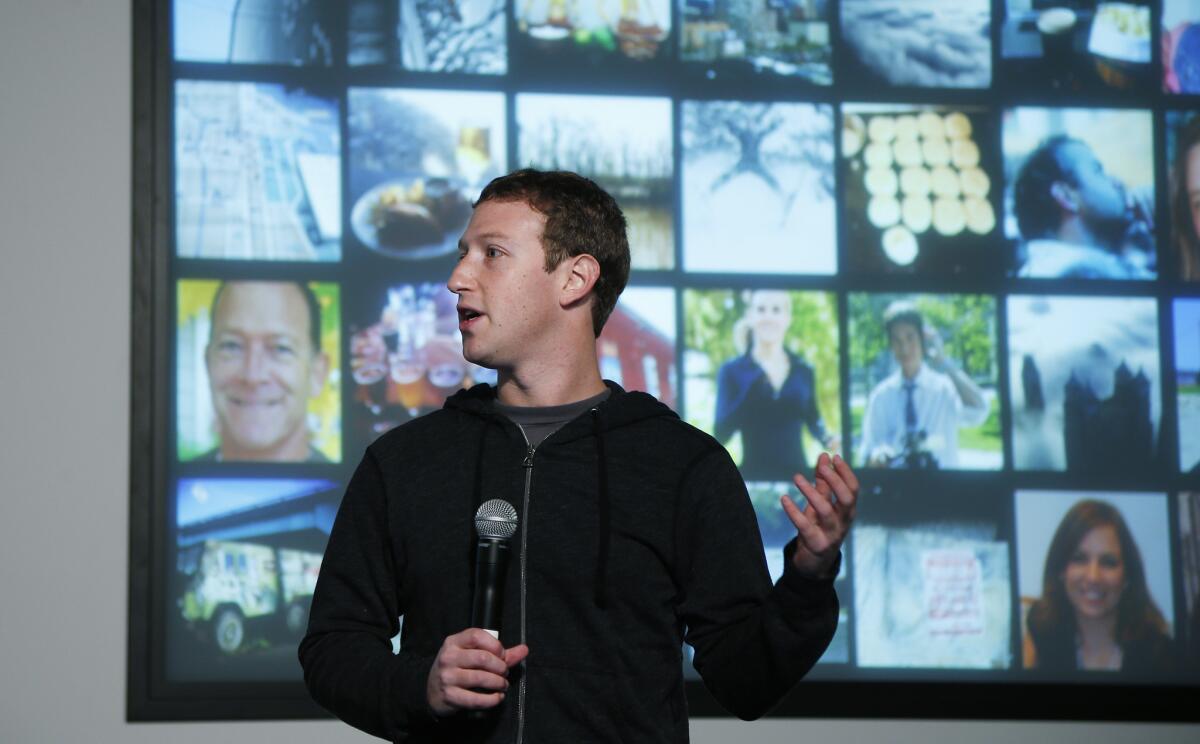What do Herbert Marcuse and Mark Zuckerberg have in common?

- Share via
To celebrate National Engineers Week -- of course you knew Feb. 17-23 is National Engineers Week, right? -- MIT Press interviews Matthew Wisnioski, author of their book “Engineers for Change: Competing Visions of Technology in 1960s America.”
Inside of the characteristic picture of buttoned-up 1960s guys in horn-rimmed glasses, there were engineers as moved by the social agenda of the age as anyone else. This minority was for civil rights and against the Vietnam War.
“The radical minority spurred the professional elite to promote a new understanding of technology as a rapidly accelerating force that our institutions are ill-equipped to handle. The negative consequences of technology spring from its very nature,” the MIT Press explains on its website. “Wisnioski argues that in responding to the challenges posed by critics within their profession, engineers in the 1960s helped shape our dominant contemporary understanding of technological change as the driver of history.”
In the interview with Wisnioski, the author connects those historical movements with the role of technology in today’s society. “Do books cause revolutions? Is the whole world watching? Does Twitter topple dictators?” Wisnioski asks. “We have been asking these questions since the French Revolution.”
Technology can make change only with the help of dedicated people, says Wisnioski. He talks a lot about how the creators of technology can engage with social issues. What does it mean that many technological advances are driven by the military? Has “sustainability” become a meaningless term for those trying to develop technologies to support it? There is much promise, he thinks, in the fact that the organization Engineers without Borders didn’t exist when he began writing “Engineers for Change” -- and it now has 12,000 members.
Where does Facebook come in? Founder Mark Zuckerberg once wrote that Facebook’s users were “dumb ....” for trusting him with their personal information. Does that disregard for users and their privacy, Wisnioski asks, “prove that Herbert Marcuse was right?”
Which means that a future Marcuse imagined looks a lot like the present Zuckerberg has helped build.
And yet I must admit my Marcuse is a little rusty. Which aspect of Marcuse’s anti-capitalist critique does Wisnioski mean? What exactly is being proved?
Here are a few possibilities -- quotes from Marcuse’s books “Eros and Civilization” (1955) and “The One-Dimensional Man” (1964):
As the affluence of society depends increasingly on the uninterrupted production and consumption of waste, gadgets, planned obsolescence, and means of destruction, the individuals have to be adapted to these requirements in more than the traditional ways.
By virtue of the way it has organized its technological base, contemporary industrial society tends to be totalitarian.
Today political power asserts itself through its power over the machine process and over the technical organization of the apparatus. The government of advanced and advancing industrial societies can maintain and secure itself only when it succeeds in mobilizing, organizing, and exploiting the technical, scientific, and mechanical productivity available to industrial civilization.
Indeed, what could be more rational than the suppression of individuality in the mechanization of socially necessary but painful performances; the concentration of individual enterprises in more effective, more productive corporations; the regulation of free competition among unequally equipped economic subjects; the curtailment of prerogatives and national sovereignties which impede the international organization of resources. That this technological order also involves a political and intellectual coordination may be a regrettable and yet promising development.
“Introjection suggests a variety of relatively spontaneous processes by which a Self (Ego) transposes the ‘outer’ into the ‘inner.’ Thus introjection implies the existence of an inner dimension distinguished from and even antagonistic to the external exigencies – an individual consciousness and an individual unconscious apart from public opinion and behaviour. The idea of “inner freedom” here has its reality: it designates the private space in which man may become and remain ‘himself.’ Today this private space has been invaded and whittled down by technological reality. Mass production and mass distribution claim the entire individual, and industrial psychology has long since ceased to be confined to the factory. The manifold processes of introjection seem to be ossified in almost mechanical reactions. The result is, not adjustment but mimesis: an immediate identification of the individual with his society and, through it, with the society as a whole.”
ALSO:
Would you pay $4,600 for a bad (but rare) poem?
Dan Brown’s book cover reveal: It’s ‘Da Vinci Code’-y!
Patricia Cornwell wins $50.9 million in suit against money manager
Carolyn Kellogg: Join me on Twitter, Facebook and Google+
More to Read
Sign up for our Book Club newsletter
Get the latest news, events and more from the Los Angeles Times Book Club, and help us get L.A. reading and talking.
You may occasionally receive promotional content from the Los Angeles Times.










